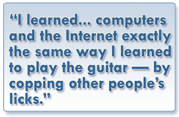I’m very fond of saying I first learned web design—HTML, JavaScript and CSS—the same way I learned guitar: by “stealing” other people’s best licks. When I took music in Pennsylvania public schools in the 60s we had an itinerant music teacher once or twice each week, and classroom teacher-led music once or twice more. We learned every good boy deserves fudge and we sang songs “by note,” and songs “by rote.” We were taught musicianship. But there was never any suggestion the goal was for any of us to become professional musicians. I’ve been thinking about that ever since I learned “entrepreneurship” is receiving top billing local curriculum as a universal 21st Century competency (e.g., C21, P21). Not that there’s anything wrong with that!
Informal learning is valid and important
Part 1 of this series was written over a year ago when I first heard the man I considered my Jimmy Page of the JavaScript world, Douglas Crocker, refer to my kind dismissively as “Webmasters…Generally they weren’t very smart.” Dion Almaer suggested the term “jQuery Plugin Monkeys,” to much laughter. To summarize, I’ve embraced the term in much the way U.S. Democrats embraced “Obamacare.” To continue, then as now I’ve always approached the WWW as an educator asking, “How can this help me share what I know?” I learned, informally, what I needed to know, when I needed to know it. Dedicated CompSci folks always did much more, and way cooler stuff in much less time (and their stuff scales!). Yet I think knowing their language gives my ideas a better chance of being realized.
I believe informal learning can be part of any learning situation—if it’s not an essential ingredient. In most cases I believe it’s synonymous with self-teaching, but I can’t imagine even a formal directed lesson that doesn’t require some degree of it. At infed.org Tony Jeffs and Mark K Smith “…focus on informal education as a spontaneous process of helping people to learn. [It] works through conversation, and the exploration and enlargement of experience. Its purpose is to cultivate communities, associations and relationships that make for human flourishing.” Surely these communities may include skilled, formally trained professionals, just as certainly they may contain others, whose opinions and experience are no less valid. If “learning how to learn” is something we value then informal learning—self-teaching—can be considered practice.
But to expand an earlier point, for centuries we’ve taught musicianship to people who had no chance or even the desire of making it a career. In sports we often find teachable moments to stress sportsmanship. We can teach entrepreneurship as a life skill, not simply a career path. jQuery to some extent takes the place of my morning crossword puzzle, but it’s also something I use on the job and in my projects, and it’s great not to depend on outsourcing for the level I need. Sure the talented, gifted and motivated should go the CompSci route, and the earlier the better, but I don’t see anything wrong with copy/paste beginnings in order to identify that gift or talent, nor to kick start the motivation.
Sure the talented, gifted and motivated should go the CompSci route, and the earlier the better, but I don’t see anything wrong with copy/paste beginnings in order to identify that gift or talent, nor to kick start the motivation.~moi
To that end I’ve developed a very basic tool and framed it in a plan I’ve mapped, that I hope people can follow on their own. I plan to blog much more about it, and my first step will be to approach elementary and middle school teachers to try it for themselves with a view towards learning how it works and then exposing one or more students to it, perhaps even developing it into any number of projects I’ve pictured around it. But for now I’ll leave you to explore it on your own, informally. Please use the comments to let me know what you think.
§
Updated 2015-02-21/2 to add Popcorn, adjust layout, improve title attributes of several elements for accessibility.
- See the video 52:45, response to question beginning 51:55
- Tantek Çelik: «…Anyone can slop together a website that works for one person, or works for 100 hits a day… But you want to build something that scales economically? You’re going to need a [computer science] person to do that.» YUIConf 2010 Panel Discussion: The Future of Frontend Engineering, http://www.youtube.com/watch?v=ntQ74KJm5Z8&feature=youtube_gdata_player, accessed 2011-12-22.

Leave a Reply